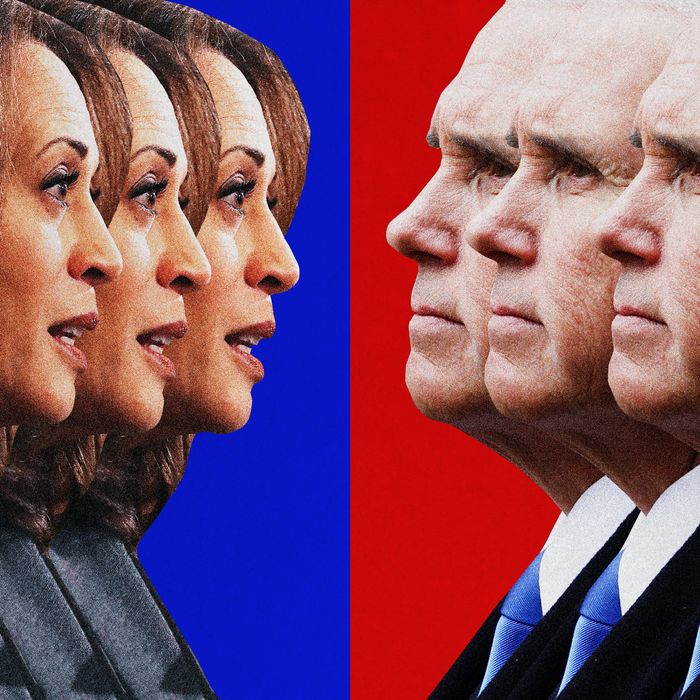By Eric Levitz@EricLevitz
VISION 2020 OCT. 7, 2020

There’s no red America and blue America — only the disunited states of Pence America and Harris America. Photo-Illustration: Megan Paetzhold. Photos: Getty Images
Four years ago, Donald Trump chose Mike Pence as his running mate because the formerly pro-choice libertine needed an ambassador to the Evangelical right.
Two months ago, Joe Biden chose Kamala Harris as his would-be veep because the old white male moderate from Scranton wanted to energize the (comparatively) young, diverse, college-educated liberals who provide his party with an outsize share of its small-dollar donations and phone-banking volunteers.
Ticket-balancing is not a new practice. But the polarization of America’s parties, combined with the peculiar and antithetical balancing needs of Biden and Trump, have brought us the most ideologically and culturally disparate pair of major-party vice-presidential nominees in U.S. history.
Harris is the child of a pair of immigrant academics, one an Indian American biologist, the other a Jamaican American Marxist economist. Pence is the son of Roman Catholic gas-station owners. Harris’s childhood was divided between Berkeley and Montreal. She attended a French-speaking primary school and historically Black university. Pence grew up in an Indiana town of 20,000 people before leaving for Hanover College, less than 60 miles away.
Both became attorneys animated by a will to political power. But for a man of Pence’s social conservatism and geographical roots, the path to such power ran through a conversion to Evangelical Protestantism and the hosting of a local right-wing talk-radio show. For Harris, it meant balancing San Franciscans’ public-safety concerns with their bleeding-heart liberalism. As their careers progressed — and their nation’s politics steadily polarized — the two came to represent evermore disparate constituencies.
In CNN’s most recent national poll, Harris is 29 points more popular with college graduates than noncollege graduates, 65 points more popular with liberals than with moderates, 32 points more popular with women than men, and 27 points more popular with “people of color” than whites. Pence, meanwhile, is 24 points more popular with noncollege grads than college grads, 87 points more popular with conservatives than with moderates, 31 points more popular with men than with women, and 29 points more popular with whites than “people of color.” These splits make Pence and Harris an even more polarizing pair of figures than Trump and Biden, who both boast a bit more appeal among secular white working-class northerners than the median member of their parties.
The running mates’ respective die-hard fan bases are even more diametrically opposed than their sources of polling support. Pence’s place on the GOP ticket signals to white patriarchal Christians that the Trump administration will fight to preserve their embattled traditions and ethnocentric conception of American identity. Harris’s place on the Democratic ticket, by contrast, signals to liberal professionals and social-justice nonprofits that Biden will fight to erode traditional race- and gender-based hierarchies and fortify an ascendent, ecumenical, multiracial conception of Americanness. Beyond the culture war, as a California senator and presidential candidate, Harris paid tribute to the economic ambitions of various progressive groups and advocacy campaigns, while Pence’s fealty to the Koch Network has made him every bit as loyal a servant of Mammon as he is of (white right-wing) Christ.
In Salt Lake City Wednesday night, Harris and Pence will likely seek to spotlight the ways their disparate constituencies are out of sync with the median swing-state voter. Pence may needle Harris for supporting the decriminalization of illegal border-crossing, Hyde Amendment repeal, or the passage of the Green New Deal (defined, in this context, as a ban on fracking, beef, and airplanes). Harris will surely note Pence’s opposition to Roe v. Wade and universal health care, toxically unpopular stances that are newly salient amid the looming vote over Amy Coney Barrett’s confirmation to the Supreme Court.
The debate is certain to be more polite than last week’s meeting between Biden and Trump (whatever their differences, Pence and Harris are both disciplined professionals). But the division that these two figures represent (both politically and symbolically) in American life — between cosmopolitanism and provincialism, city and country, secularism and fundamentalism, feminist advance and patriarchal tradition, social justice and racial innocence — is starker than any their bosses collectively embody. Pence and Harris offer irreconcilable visions for America’s future. And that future will never be more than one actuarially plausible tragedy away.
No comments:
Post a Comment